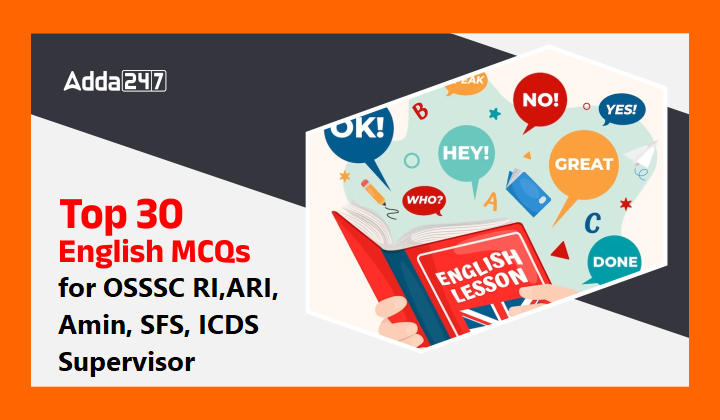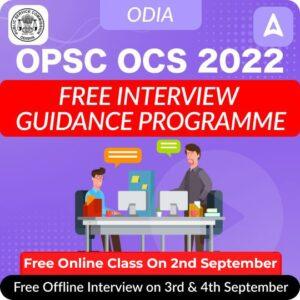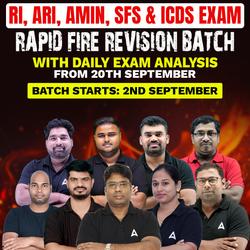English language proficiency is a crucial skill for various competitive exams, including OSSSC RI, ARI, Amin, SFS, ICDS Supervisor. To excel in these exams, candidates must have a strong command of grammar, vocabulary, and reading comprehension. Let’s explore the top 30 Multiple Choice Questions (MCQs) that cover essential English language topics, along with their answers.
Top 30 English MCQs For OSSSC RI,ARI, Amin, SFS, ICDS Supervisor
- She was accused ___ theft.
(a) for
(b) of
(c) with
(d) at
Ans. (b) of
Sol: “Accused of” is the correct phrase. - The cat is hiding ___ the table.
(a) over
(b) under
(c) on
(d) through
Ans. (b) under
Sol: “Under” indicates a lower position relative to the table. - He did not succeed, ___ he worked hard.
(a) although
(b) because
(c) and
(d) for
Ans. (a) although
Sol: “Although” shows contrast between working hard and not succeeding. - You must work hard ___ you will not pass the exam.
(a) or
(b) but
(c) and
(d) so
Ans. (a) or
Sol: “Or” connects two alternatives. - Change to passive: They built a new hospital last year.
(a) A new hospital was built by them last year.
(b) A new hospital was build by them last year.
(c) A new hospital is built last year.
(d) A new hospital had built by them last year.
Ans. (a) A new hospital was built by them last year.
Sol: Correct passive construction: “was built” in past tense. - Change to active: The work was done by John.
(a) John does the work.
(b) John has done the work.
(c) John did the work.
(d) John is doing the work.
Ans. (c) John did the work.
Sol: “Was done” changes to past simple active: “did.” - A person who talks too much:
(a) Introvert
(b) Extrovert
(c) Garrulous
(d) Reticent
Ans. (c) Garrulous
Sol: Garrulous means excessively talkative. - A person who knows everything:
(a) Optimist
(b) Omniscient
(c) Omnipotent
(d) Omnipresent
Ans. (b) Omniscient
Sol: Omniscient refers to someone all-knowing. - He was seen at the ___ of the crime.
(a) sight
(b) site
(c) cite
(d) sit
Ans. (b) site
Sol: “Site” refers to a place or location. - The ___ of the argument was lost on the audience.
(a) coarse
(b) course
(c) curse
(d) corps
Ans. (b) course
Sol: “Course” refers to the direction or flow of something. - Synonym of ‘Eloquent’:
(a) Persuasive
(b) Quiet
(c) Clumsy
(d) Unskilled
Ans. (a) Persuasive
Sol: “Eloquent” means persuasive or articulate. - Antonym of ‘Diligent’:
(a) Industrious
(b) Careless
(c) Hardworking
(d) Cautious
Ans. (b) Careless
Sol: “Diligent” means hardworking; “careless” is the opposite. - To ‘burn the midnight oil’:
(a) To light a lamp
(b) To work late at night
(c) To waste time
(d) To sleep early
Ans. (b) To work late at night
Sol: The idiom means to stay up late working. - To ‘spill the beans’:
(a) To cook something
(b) To reveal a secret
(c) To create confusion
(d) To make a mess
Ans. (b) To reveal a secret
Sol: “Spill the beans” refers to divulging confidential information. - He is good in English but weak at Mathematics.
(a) good in
(b) but weak at
(c) no error
Ans. (a) good in
Sol: It should be “good at” instead of “good in.” - Neither John nor his friends has arrived.
(a) Neither John
(b) nor his friends
(c) has arrived
(d) no error
Ans. (c) has arrived
Sol: “Friends” is plural; it should be “have arrived.” - Choose the correct option: He ___ to the store, but it was closed.
(a) go
(b) gone
(c) went
(d) goes
Ans. (c) went
Sol: The past tense “went” fits the sentence context. - Choose the correct option: The players were excited ___ the game.
(a) for
(b) about
(c) to
(d) at
Ans. (b) about
Sol: “Excited about” is the correct prepositional usage. - Correct the sentence: I have seen her yesterday.
(a) I see her yesterday.
(b) I had seen her yesterday.
(c) I saw her yesterday.
(d) I have been seeing her yesterday.
Ans. (c) I saw her yesterday.
Sol: “Have seen” cannot be used with specific time adverbs like “yesterday.” - Change to indirect: He said, “I will go to the market.”
(a) He said that he will go to the market.
(b) He said that he would go to the market.
(c) He said that he goes to the market.
(d) He said he go to the market.
Ans. (b) He said that he would go to the market.
Sol: “Will” changes to “would” in indirect speech. - Change to direct: She said that she was tired.
(a) She said, “I was tired.”
(b) She said, “She is tired.”
(c) She said, “I am tired.”
(d) She said, “She was tired.”
Ans. (c) She said, “I am tired.”
Sol: “She was tired” changes to present tense in direct speech.
Sentence Rearrangement & Para Jumbles - She is the ___ girl in the class.
(a) more intelligent
(b) most intelligent
(c) intelligently
(d) more intelligently
Ans: (b) most intelligent
Sol: Superlative degree “most intelligent” is used for comparison in a group. - That is a ___ news for the company.
(a) great
(b) greatly
(c) greatest
(d) greatly
Ans: (a) great
Sol: “Great” is an adjective modifying “news.” - ___ sun rises in the east.
(a) A
(b) An
(c) The
(d) No article
Ans: (c) The
Sol: “The” is used for unique objects, like the sun. - He is ___ honest man.
(a) a
(b) an
(c) the
(d) No article
Ans: (b) an
Sol: “An” is used before vowel sounds. - He said, “I will go there tomorrow.” (Change to indirect)
(a) He said that he will go there tomorrow.
(b) He said that he would go there the next day.
(c) He says that he would go there tomorrow.
(d) He said that he will go there the next day.
Ans: (b) He said that he would go there the next day.
Sol: “Will” changes to “would” and “tomorrow” becomes “the next day.” - She said, “I am writing a letter.” (Change to indirect)
(a) She said that she was writing a letter.
(b) She said that she had written a letter.
(c) She says that she is writing a letter.
(d) She said that she writes a letter.
Ans: (a) She said that she was writing a letter.
Sol: Present continuous changes to past continuous in indirect speech. - Correct the sentence: The police has arrested the criminal.
(a) The police have arrested the criminal.
(b) The police has been arresting the criminal.
(c) The police was arrested the criminal.
(d) The police had arrested the criminal.
Ans: (a) The police have arrested the criminal.
Sol: “Police” is a plural noun and should take “have.” - Correct the sentence: I am knowing the answer.
(a) I know the answer.
(b) I have been knowing the answer.
(c) I knew the answer.
(d) I am know the answer.
Ans: (a) I know the answer.
Sol: “Knowing” is a stative verb, so “I know” is correct. - The cake was so delicious that everyone ___ it.
(a) enjoys
(b) enjoy
(c) enjoyed
(d) had enjoyed
Ans: (c) enjoyed
Sol: The past tense “enjoyed” matches the sentence’s context.





